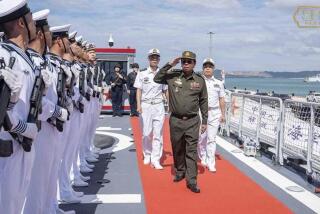Editorial: Tribunal sends China into treacherous waters
By issuing a sharp ruling against China’s aggressive moves in the South China Sea, an international tribunal may turn a regional conflict into a global one — or trace a peaceful path out of an increasingly tense situation. The choice is largely China’s to make, although it is incumbent on leaders in the United States and Asia not to push the People’s Republic in the wrong direction.
The immediate issue was a complaint by the Philippines that China had violated the 1982 U.N. Convention on the Law of the Sea by interfering with fishing and oil drilling and building on reefs in waters claimed by the Philippines. But the tussle over the rocks and waters throughout the South China Sea has been going on for centuries. China has formally claimed sovereignty over all of the land in those waters — an area larger than the Gulf of Mexico — at least since 1947, when official government maps showed China’s border extending hundreds of miles beyond its coastline through a U-shaped series of dashes (now known as the “nine-dash line”).
Naturally, other countries in the region have asserted competing claims. But China has gone further , building airstrips and ports on disputed reefs and using its coastal police to harass other countries’ fishing fleets. The moves reflect the widespread view in China that rival claims were just the latest efforts by envious outsiders to seize China’s land and diminish its power.
This may be the riskiest element of the dispute: that it feeds a culture of grievance in China, one that draws its emotional strength from the foreign occupations and forced territorial concessions of the 20th century. Many Chinese leaders and scholars argue that the Philippines went to the U.N.-backed tribunal in The Hague at the behest of the United States, which they say is determined to not let China challenge its power in the Pacific. To the Chinese, the case went hand in hand with the Obama administration’s “pivot to Asia,” which moved the bulk of the U.S. Navy into the Pacific, and with the U.S. Navy’s freedom-of-navigation exercises in the South China Sea.
That puts the Obama administration in a delicate spot: It can’t endorse China’s bullying of its neighbors, so it can’t back away from its support for them or the freedom of navigation, but it also can’t afford to be seen as capitalizing on the ruling either.
The irony is that this tiff is exactly the sort of dispute that China and other maritime nations designed the U.N. convention to settle. Yet China refused to participate in or even acknowledge the tribunal, saying any problems should be worked out through one-on-one negotiations between the neighbors. That violates the principle that China signed on to when it ratified the U.N. convention — to level the playing field so that major powers cannot use leverage to extract sweetheart deals from smaller neighbors — and undermines its claim to be a responsible international actor.
The tribunal didn’t decide who had sovereignty over the reefs and rocks in the South China Sea; rather, it declared that the disputed territories (including the ones China had been building on) weren’t inherently habitable islands and therefore were not entitled to expansive territorial waters. In so doing, the tribunal called into question China’s claim to the entire nine-dash-line area.
The right approach now is for countries throughout the region to negotiate jointly an agreement that ensures each one fair access to the resources while respecting the rights of all nations to travel freely in shared waters. Even as top Chinese officials dismissed the ruling and said it would have no effect on China’s “territorial sovereignty and marine rights,” they said they were ready to work with other coastal states to ensure safe and open shipping lanes through international waters. That’s a start, but they need to follow through by convening talks among all the region’s stakeholders to resolve the conflicting territorial claims. And policymakers on both sides of the Pacific need to provide time and space for such a process to succeed.
Follow the Opinion section on Twitter @latimesopinion and Facebook
More to Read
A cure for the common opinion
Get thought-provoking perspectives with our weekly newsletter.
You may occasionally receive promotional content from the Los Angeles Times.





